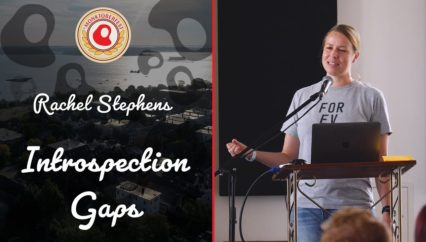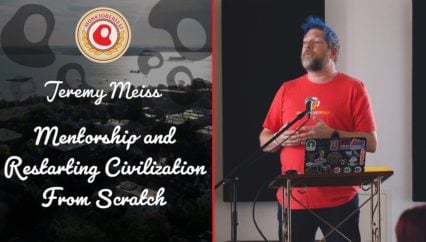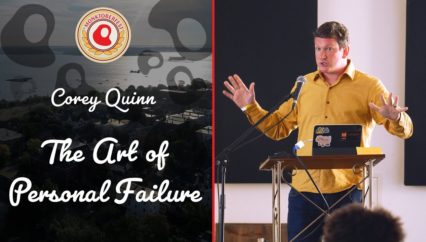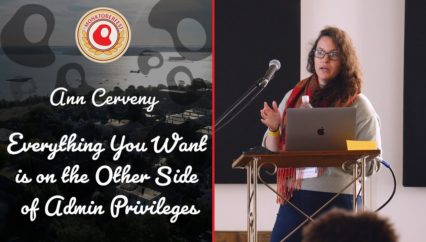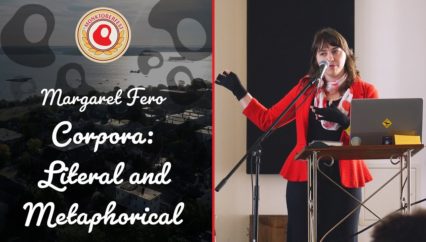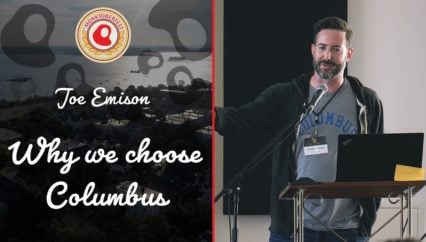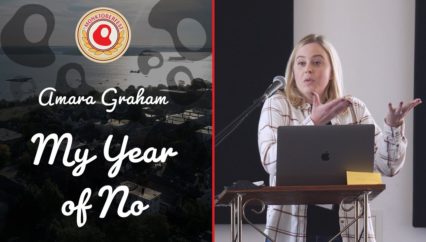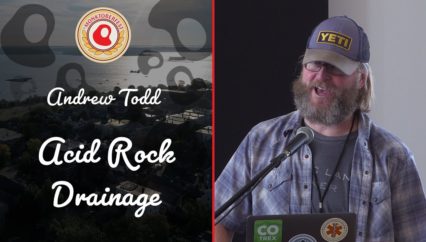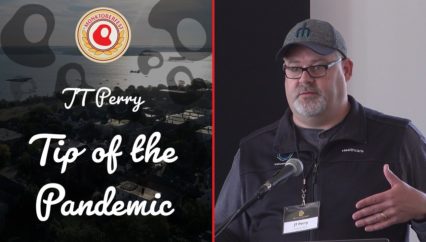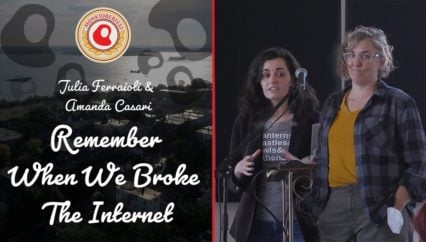Once upon a time, an investor proposed a “college replacement” by gathering up 18 year olds in order to give them money in exchange for future earnings. It was not a particularly thought through take, but it spurred this talk, which is a particularly thought through take. And heart-felt. And poignant.
Transcript
All right, thank you very much, Steven, and thank you everyone. This conference we all know what an important and unique venue this conference is. Steve, as you said many times, you have talks here that we don’t see anywhere else and that’s exactly what we’ve seen over the last day and a half. We’ve seen just extraordinary stuff that we don’t see elsewhere. I am very, very grateful for Monktoberfest, I’ve given some of the most important talks to me personally. I’ve given here. And Steven is right. He is taking my first couple of slides, so I was serious about that. But it does always start with a tweet. It does seem — this is the conference that started Twitter a tweet. And Steve may of may have identified a bit of a pattern about me tweeting hot takes and then being asked if that’s my Monktoberfest talk and I’m actually wondering if this isn’t providing feedback into my brain. Am I desperately putting out those hot takes, wondering which one is gonna take which one is going to earn that precious DM or reply from Steven.
>> I don’t know what’s going on, this might be a very unhealthy relationship with Monktoberfest. Because there is a seasonality to it now, do I do hot takes more in February and March when you’re figuring out the structure of Monktoberfest? I don’t know, I’m nervous about this. This one starts with a tweet, starts with a hot take. We’ve been kind of mentioning Silicon Valley Bros in passing, we haven’t really been specific. I feel a little seen when we say that. I’ve spent my entire career in Silicon Valley. I think it is — I — I’m still a very strong believer in Silicon Valley, not necessarily as a geographic region, but as an idea.
My Silicon Valley is the Silicon Valley of the traitorous 8 and so many steroid company so much innovation happened in Silicon Valley. I don’t consider myself a bro even though my children call me bro when they’re upset with me or if they’re really upset with me, bruh, and you have not wanted to murder a teenager more when usually full sentence would be like, I am getting up, bruh, and I am going to murder you in your sleep. So I’m not a bro, I’m not a bruh, but it is indisputable that my Silicon Valley has none trumped unfortunately by a different Silicon Valley and so lets be real specific. I love the facial expressions. I wish we had the video of the facial expressions of people reading this tweet.
This is a tweet from Sam Altman, Sam Altman is my personal antichrist. Sam Altman’s Silicon Valley is everything that my Silicon Valley is not. This tweet definitely got me hot. I do not follow Sam Altman, by the way, I also don’t have the self control to block Sam Altman, Twitter very much a part of Sam Altman’s Silicon Valley and has spent the best minds of our this guy is pretty ease I as it turns out, drag this tweet in front of him, like he’ll engage and there’s no way to indicate, like I’m engaging with this, but I hate myself for doing this. So I need another mouse button that is like I’m clicking on this, but I’m rage-clicking on this and for my own mental health, could you not drag in in front of me and OK, I’m clicking on this tweet and God DAMN it, I’m pissed off so I’m hot and we’re going to go through this tweet in detail. The version of college replacement that I’m super interested in, I super-hate it when people put “super” in front of an adjective to say that they’re super interested in. Find the smartest and most driven 18-year-olds in the world, give them a decade + of salary and in exchange, in case you weren’t throwing up, in exchange for a small percentage of future earnings.
So one thing to know about me, I’ve got kids. I’ve known a lot of you in the room for a very, very long time. I feel we have seen one another’s kids grow up. And my kids, I got an 18-year-old. I’ve got an 18-year-old, a 15-year-old, and a 10-year-old and my feeling about this is pretty unequivocal. And I say that — and you know, a theme that’s going to come up, if you don’t have kids, or if you’re earlier in your career, when people talk about 18-year-olds, you think of yourself, and that’s natural, because you remember being 18, you remember thinking I’m an adult when I’m 18, we’re going to talk about in in detail. One thing that’s very important when I read this and other parents read this, I don’t think about myself, I think about my kids. So that’s part of the reason I feel very unequivocal.
And Steven, oh, my goodness, is that your next Monktoberfest talk? And I was like oh, God, yes, yes, thank you, I’m so grateful and again I don’t realize the degree to which I’m doing this, for Steven, apparently. This is all happening like deep in the lizard brain, and then something happened that has never happened. This — this back and forth, this is obviously not the first time that happened, but something happened that has never happened before. There was this reply. Please yes. That’s my wife.
And she and I have been married for a long time. We’ve raised our kids together. And I don’t know that my wife has ever asked me to give — I mean my wife is normally asking for me to — I agree with you, can you stop talking now? That I feel is more the — so the fact that my — the that my wife was asking for this talk, I mean obviously I was going to give it anyway, but I think it actually showed the degree to which she, too, as the person that has raised our kids together, she, too, was just revolted by this.
All right, so this is my talk outline. So let’s take it apart.
First of all, a version of college replacement. What is the purpose of college education? And who — who has tasked Sam Altman with replacing it? What are we replacing? What are retrying to replace? What is the problem? I think the problem — and I think we’ve seen this a lot in the talks of the last day and a half, we’ve got an accessibility problem, we absolutely have an affordability problem in higher education, but I don’t know that the problem is like the idea of higher education.
I don’t know that we’re actually trying to roll higher education into the street and light it on fire. I think we want it to be accessible for many more people. We want it to be affordable. And we should be asking ourselves, as we’re thinking about higher education, there are lots of problems with higher education, but I argue those are not problems with higher education in the abstract. It is the problem with the way we have implemented aspects of higher education.
So I think it’s very important that as we’re thinking about this, like, oh, yeah, I want to replace college, too, OK, let’s stop, what do we want to replace it with and let’s be very deliberate, because I think we want to it address cost and accessibility. I think the purpose of education is actually pretty sound and it dates back for a very long time for very good reasons.
So as we’re kind of talking about this, let’s keep in mind what we’re trying to do.
Then we get to find the smartest — oh my god, I’ve got so many red flags are up on this one. What does smartest mean? How are we going to assess smartest?
Are we going to give people an exam? We know there are lots of problems with giving people an exam? What does it mean to be a the smartest? Are we selecting for ultimate ability or are we selecting for precociousness and we do a grave disservice to the precocious when we herald them.
Because we’re telling, you’re smart, you’re gifted. How is that internalized by a 7-year-old or a 10-year-old or a 13-year-old? And this was made very vivid for me when I was at school, went to college, and went to university, and there was someone in our freshman class who was steroid, he was a child prodigy, featured in Newsweek. He was taking grad ut-level classes when we were all first-years, he was TAs, the freshman calculus class and OK, this guy and I’d heard about him long before I’d actually met him. When I met him, I was a little underwhelmed. I don’t know what I was expecting, I was expecting him to have telekinetic powers or something or maybe a large brain or something, but I met him, all right, he seems like just a dude but a bright dude.
And he and I were studying math and computer science and he and I were taking the operator course at the same time. You may remember, this is a hard course. And it’s hard because it’s like intellectually hard and it’s also a lot of work, like, you can’t just prodigy your way into an operating system, as it turns out. Like, precociousness is only going to buy you so much when you’re trying to debug a problem or a stack going in the wrong direction.
And so this course, terrific course, was very lab-intensive, had a lot of labs and also had problem sets associated with it and the problem sets were open-ended design questions, and they were — you know, the professor was a little — great professor, but a little idiosyncratic, to put it mildly and he would often — there was not necessarily a right answer and certainly his answer would be an answer, but not necessarily the right answer. Well, this kid who had been featured in Newsweek as a math prodigy, turns in what is verbatim the answers and the professor calls him? , did you cheat? Get my answer key? No, no, I didn’t cheat, I just magically came up word for word your same weird answers.
Well, the next problem set, the professor seeded a false answer key in the same place that he put the actual answer key, and this kid turned in the answers to the wrong problem set, turned in the answers to a problem set that didn’t exist and I’ve always wondered what was going through his mind.
As he — as it turns out, he was a TA in the math department and he was exploiting the fact that the NFS was shared trusting the math department, that ended, and he was able to exploits privileges in the math department to get this key and what was going through his head? He’s been busted, and amazingly not punished, and now he’s doing it again and I’ve got to think — and I go back to Rachel’s superlative talk, about what was going on? Fear.
Absolute gripped with fear. I’ve been the smartest kid since he was 7. I was in Newsweek. I got target on my back from all these other kids that think they’re actually pretty smart and they want to know, like, do I have telekinetic powers, some kid actually asked me that. I didn’t actually ask him that.
[laughter]
But this poor kid, I — the only conclusion that you can draw is he was desperate to get caught. Desperate to get caught.” Please, somebody, turn on the lights!.” I was smart when I was 7. I was precocious, I was in Newsweek, I am gripped with fear, because this operating systems course is so goddamned hard, I have to do so much work for it. I don’t know what’s going on. I’m failing. I’m failing. But how can I fail? I’ve been told that I’m smart my entire life. Don’t tell kids they’re smart. Please! It is such an injustice for that 7-year-old that feels harmless to the 7-year-old, but you’ve got an 18-year-old who ultimately, not expelled, but takes a long break from his higher-level education as the university asked him to go figure some things out.
And it’s heart-breaking in so many different ways. My heart breaks for that 18-year-old who doesn’t know what else to do.
So I think we need to be really, really careful with precociousness. Please, please, please be careful with precociousness, there is a great peril in telling kids they’re smart.
The other question is, how are thesin found? These 18-year-olds? How did you find them? If you know anything about my kid’s an athlete, you don’t just like show up when you’re 18 and go play athletics at the highest level. You started when you were 10, you started when you were 7. And at every level, you were going up to a higher and higher level, and more and more adults are paying attention. The only way you find an 18-year-old as the smartest 18-year-old is you’re paying attention when they’re 13 and 14 and 15, and we can argue about whether an 18-year-old is a child. Can be an adult in some sense, I think it’s a child in others. But a 14-year-old is definitely a child and we’ve got a youth fetish in this industry that scares the hell out of me as a parent.
And a friend of mine is extraordinarily wealthy, and one of the things he likes to do in the words of my colleague, he likes to collect baseball cards and by that I mean smart people, he likes smart people and I like him for liking smart people and he likes to have conversations with smart people and you know, he’s got a lot of money, so he pulls everyone together every once in a while. And I happened to be a baseball card, you know, keep me under your bed every once in a while, put me on the spread every once in a while, I get to meet the other baseball cards, I’m completely content with this relationship. So we’re going to have a weekend getaway and I feel privileged to be invited and it’s fun to meet other interesting people and we’re all going to be in tents and I’ve got a tent mate, oh, this will be interesting, who is my tent mate? Professor in biology? Who is this person? Please let it not be a crypto enthusiast or a bio hacker. Please Jesus, I just — I know, no bio hacker. I think can I fall asleep with the cryptocurrency enthusiast drowning on, the bio hacker is it 100% bad news, so can we please please — so I’m Googling this person and imagine my shock when I realized this is a 14-year-old. I at the time, my 18-year-old was 15. this is younger than my oldest child and I said to the organizer, you put me in the tent with a child. I’ve got a lot of follow-up questions for you. How many children are at this event out of curiosity? The question I’m sure you have is, where are their parents? Is alcohol being served? And I’m sure this is a very precocious 14-year-old, I have no doubt. It is a 14-year-old. Not yet. You don’t get to come to Monktoberfest yet. You will at some point, but not yet. You are 14.
And my mother — my mother’s a school psychologist, godless my mother, a terrific parent, much better parent than I am. My mother was mortified. Absolutely mortified. And she said Bryan, you are now responsible — clearly no one else is taking responsibility for whatever children are there. You are responsible for them. I emailed mailed the organizers, they agreed that a 14-year-old should not be sharing ar tent with me. I’m not interested in picking among the children, we’re going to be thank you, no! And my mother said, Bryan, if you see anything — and I mean anything, that doesn’t look right, you call the police.
And they needed a lot of my mom’s wisdom. They could use my mom as an organizer for that event and so if you organize events and you have a 17-year-old, a 16-year-old, a 14-year-old that wants to attend your event, you need to be asking a lot of follow-up questions. My answer to that would be no, about you your answer may be let me talk to your parents. if they’re there, you should not serve alcohol. Just my opinion.
OK, so we need to be very, very careful about when we are talking about children. And then we get the most driven, we’re going find the most driven 18-year-olds, driven 18-year-old, how are you assessing that out of curiosity? And when you’ve got drive in someone that is so young, have you considered that you might be selecting for the drive of their parents, not for their own drive?
So be very careful when you’re looking at how driven an 18-year-old is, and I’ve got the great privilege — I work with a lot of adolescents, I run the kids’ scout troop which I love and I see a lot of driven 18-year-olds, but they’re driven in a way that is very age-appropriate. It’s very easy to tell drive — intrinsic drive in an 18-year-old from extrinsic drive when it’s actually their parents. So we want to be careful about assessing the driven.
And then we arrive on the think that is really objectionable about this whole thing, which is 18-year-olds. And this is amazing to me, and it shows how young neuroscience is. But as recently as the 1990s, when I was an 18-year-old, the dogma, in neuroscience, was that brain development was done. Which is — I mean — I’m like, look, we were not all orangutans once, we were not all mice once, so reasoning about the mouse brain, but we were awful 18-year-olds. Every single one of us was an 18-year-old.
Like, sure neuroscientists, really you never did anything stupid as a 17-year-old or an 18-year-old and it never occurred to you that your brain may not have been fully developed? This is one of these things like the invention of seatbelts, like we invented cars 30 years before seatbelts and people were like, God, why is everyone dying in car accidents? And seatbelts way more subtle than they appear and the biggest innovation in automobile was safety glass. Is roping people onto the seat that subtle? I guess it is. So, is it that subtle that the brain has not fully developed? I guess it is, and we now know, by the way, this is false. This is false.
Your brain — again, we all know this, right, because you can think of yourself as a 16 or 17 or 18-year-old the brain is still developing. What is developing the prefrontal cortex, judgment. That is what’s still developing. It does not fully develop until at least the mid 20s.
And certainly, when I knew this, a bunch of my own personal past makes a lot more sense.
[laughter]
You know? God bless Claire who’s here who knew me as a 22-year-old, Claire, I’m so sorry. Claire — I remember vividly when Claire’s now 25-year-old daughter, when Claire was pregnant with her 25-year-old daughter, and I — I am so sorry, I’ll be apologizing for the rest of my life. I had just — I was 22. I never been around a pregnancy that was like, hey, good news, everybody, so I was like, oh my god, you’re pregnant? And she was like, yes, Bryan, I’m pregnant, don’t be weird about it and I was like, OK, blah, blah, blah and I’m so sorry for the blah pla blah. So Claire, I’m sorry and but it was actually really valuable to have that brain continue to develop. By the way, Claire is also the person when Bridget became pregnant with my now 18-year-old, Claire is also the one who broke the news to me, she said, hey, um, so have you figured out what your position is on sleeping? What — position on sleeping? Like I’m for it. And she’s like, oh, you sweet summer child and I’m like, oh, no, what am I — yeah, co-sleeping, are you cloth, are you paper? By the way, new parents, none of that shit matters. Just keep your kid alive, that’s all that matters. Put them on back on sleep keep them from SIDS, yes.
The other thing is the limbic center is at full development so the limbic center where we process things like social rewards, that’s done, that’s cooked and the judgment is like not developed. Wait a minute, that seems like that’s a bad idea. Yes, yes, that’s a bad idea. Evolution, why, why you do this?
So it’s reasonable and normal for your 18-year-old to want to do things to please their friends, and then because their judgment is impaired, they will do dumb things to please their friends. This is normal. It’s actually good, it’s healthy. You want them to have this kind of social connectedness, but keep that in mind, be sympathetic when we’re dealing with a 18-year-old. They’ve got this asymmetry in their brain that’s rocking them. They’re trying to find their own identity. But they are very much not yet developed and I think one of the things that’s so hard — and by the way if you’re a parent of younger kids if you haven’t yet, just walked onto the campus of a high school, the first time you walk onto a campus of a high school, will scare the hell out of you, because you will realize, like, wait a minute, these are only like 3 or 4 years older than my sweet, precious, 10 or 11-year-old, and these bodies are adults, and the brains I can see are still children. It’s like wait a minute, do we have child brains driving adult bodies? Yes! That’s exactly what we have!
And it’s like, but that’s going to be yes! Yes!, it’s bad! I mean it’s an adventure. It’s an venture. So that first experience definitely can wake you up. One of the other things that makes 18-year-olds really hard, and the reason, by the way, when I talk about this, a decent portion of the internet lunges, when you think of yourself as 18, you think of your adult self and one of the things that’s vexing about 18-year-olds is they will tell you I am an adult. Here here I am, I’m an adult. Ask me some things, quiz me. I’m an adult. And they’re pretty good at passing that quiz, by the way, but then when their friend wants them to do something stupid, then they kinda flunk it. So 18-year-olds are terrific, but they are — they seem fully adult, but they are not. And importantly, they are vulnerable. It is our responsible to protect them.
So you can imagine with all this, Sam Altman went hey, OK, so let me take this fully limbic center and underdeveloped prefrontal cortex and I want to give them a decade of salary to work on whatever they want. Do I have to spell this out to you? We are adding fire power to a weapon that cannot be named. It is not wise emphatically and you can only imagine the grotesque things that would have grown out if we had give you a decade of salary at 17 or 18. In my case it would be very cringeworthy and embarrassing.
Then we get to the smart peer group. Like a smart peer group. I want to have a smart peer group. Here’s the thing about who we learn from. It’s not your exact peers, especially when you’re young.
You are learning from your older peers.
It’s the one, one year, two year, three years, five years, ten years ahead of you. It’s Claire educating me as a 22-year-old, but honestly, right because part of the reason that I was flat-footed when Claire was pregnant with Gabby is like, wait a minute, you and I are peers, and actually Claire is further down the life of adulthood, and by the way, kid, this is what adulthood looks like. Buckle your seatbelt or install your safety glass if you haven’t invented that yet.
So when I look back at my own education, I didn’t learn from my true peers. People that were my same age. It was always the upper classmen, the TAs, the professors when I started my working career, it was the older engineers. When I first came to Sun Microsystems in 1996, when my daughter who is thought I thought Sun micro-systems was a brewery, and
Brewery? How does it make any sense? Anyway, not a brewery, a computer company, that’s where I went in 1996, and when I came out in 1996, Kevin Clark, one of our colleagues, I remember him vividly saying, you’re a hacker, we’re going to turn you into an engineer, and I remember being offended by that, but he was right. So I think you learn from those older peers and I think just as there is peril in telling a child they are smart, it is really dangerous to take a group of children, isolate them and tell them you all are smart. It’s like no, no, no, no, no!
0 and because they will internalize that and you will a have all of the failings of group dynamics with all of these failings of being told that you’re smart and then again if you’re not vomiting yet, the — in exchange for a small percentage of future e, this is just disgusting, it is rapacious, it is manipulative. It’s exploitive, it’s cynical, and so let’s say we do dumbass plan. When the 18-year-old is a 20-year-old that says I actually want to be a nurse, what do they do? You’ve got the small percentage of future earnings? I want to become a teacher, I want to walk the Pacific trail. It’s so wrong. What if somebody wants to return to school. What do you do with that person? Actually you know what I actually watched this talk from Monktoberfest 2022 and what the hell was I doing when I did this. Well, technically my parents watched it but I want to go back to school and what do you do then? S so gross because it feels predatory.
You are exploiting that under-developed prefrontal cortex and you’re hitting that limbic center right in the crosshairs and it’s really, really wrong. So I’ve got an easy way, Sam altman to fix this tweet. I’m going to leave super in there. So you can still be super-interested even if I find it super annoying but I’m super-interested find the smartest and most driven 28-year-olds. I’ve got no problem with that. Give them a decade of salary, sure, your money. It seems totally reasonable. But I feel that Altman would say, no, no, I don’t want the 28-year-olds, because they wouldn’t be interested in doing this. Uh, really? Oh, that’s interesting. That’s interesting! Tell me more! By that time they’ve got things they’re doing — like oh, do you think that their prefrontal cortex may have become developed and they may realize that you’re an ass and they do not want this?
It’s like, hey, yeah — I’d actually rather go to the 18-year-olds, well, then, I stand by my original analysis, it’s child abuse, it’s wrong.
So just to sharpen the point here, childhood is really important. And the older anyone gets, the more they will tell you this. Childhood is finite. Life is finite, too, but it’s a lot longer, your adult life is much, much longer than your childhood. And childhood is precious and important and special, and it, by the way, not knowledge accumulation.
I mean, how much knowledge from your childhood do you rely on? Not very much.
That higher education piece becomes really important. That’s where you accumulate a lot of knowledge, because you’re ready for it when you’re 18. Why are you ready tabor it? You’re ready for it because hopefully you’ve gotten the most important thing of childhood, character development. This is what we should be instilling in our children, developing their character, honesty, integrity, decency. Hard work. You should be raising your children to not be that 18-year-old gripped by fear desperately wanting to get caught cheating because someone will turn on the lights. You will question your own parenting, am I doing it right? And you will only have little glimpses, I mean for me — and I — if you can forgive the proud papa for a moment, one of these moments happened when the high school disciplinarian called me up and it’s like oh god, what now? What aspect of the underdeveloped prefrontal cortex am I going to clean up the wreckage from now? And she’s like no, no, it’s good. I think most of you know this but whenever you reach out to somebody who may reasonably think it’s bad news, if it’s good news, please volunteer that in early in the conversation. Sorry, I had to call you, so your son and his friend just turned in a $100 bill to the office that they found and I’ve never seen that before. And I thought I would pass that on. And first of all, I mean, God bless that kid.
And God bless her for passing that on. Because that was a moment that we came back to a lot in — as he — it’s been rough for him as an adolescent. It’s been rough for a lot of adolescents. Covid has been really, really tough, Covid has been academically tough for a lot of teenagers, and as he was going through his moments — we assess kids in so many different ways and he was going through his own struggles to be able to say you know what kid? I got the kid who turned in the $100 bill and I’ll take that every day, all day. I’m so proud of you for doing the right thing when no one knew. When no one knew. Profoundly proud of him.
And it’s really hard to know when you’re raising kids in that direction. I mean, it would have been just as plausible to be like, oh, hey, I got a hundred bucks and I spent it on White Claw — by the way, if you don’t have teenagers and you don’t know what White Claw is, White Claw is alcohol that tastes like candy, so of course it’s aimed at the limbic center and the underdeveloped prefrontal cortex, and as adults we want to encourage that experimentation, without the White Claws, please, please, please. Without the White Claws, honestly, people who market or involved or profit from selling substances to those that are under age, I don’t know how you sleep at night, and all I can say is I hope your kid goes to the party where everyone is bombed on White Claws, too, because it’s pretty awful as an adult. We want to keep them safe, it is way easier said than done, but we want to encourage that experimentation.
So what about the young technologist, what about the young person that I actually know, this industry is my calling. I want to join you, I want to work with you. For those technologists, we have to keep in mind that they are still young. That prefrontal cortex is not going to develop until their late 20s. But those technologists like to take risks and risks can be good, young technologists can see the world as it isn’t, about you potentially could be. That’s incredibly powerful. We want to encourage that. We want to encourage that. You probably if you haven’t read Tracy Kidder Solve a New Machine, excellent book. There’s a task to develop a simulator, and they deliberately task this person with developing the simulator and it takes him much longer than he thought it would take, but he took it on because he thought it would be easy, that underdeveloped prefrontal cortex was really important. Now f you’re a young technologist, it’s not all risk-taking. You need to know how little you know. The world is so complicated and so deep, and everything is so sophisticated. I feel like I started a computer company and I keep waiting for the day when I know how computers work.
[laughter]
Well it’s not today, and it wasn’t yesterday and it probably is not going to be tomorrow. Because these things are so profoundly complicated. It is amazing. We truly stand on the shoulders of previous generations. The printed circuit board, the thing that we all rely upon, is unbelievable how complicated the printed circuit board is, so what we need to do, and this, I believe, is the purpose of higher education, is to bridge the ego from the narcissism of childhood which is healthy. Kids should think about themselves. That’s OK.
Your 4-year-old is not a sociopath. I’m here to tell you that. If you’re the parent of 4-year-olds, you’re likes, actually, OK, I appreciate you saying that, but my 4-year-old is a sociopath, I’m pretty sure. No, they’re not a sociopath, I promise, that narcissism is normal and healthy, they will outgrow it, but that is a key bridge to out from the ego of the late teens and to accept the humility that is required to truly enter the world and endeavor to improve it, so that is the role of higher education and God bless the graduate students. The graduate students are the unsung heroes of slaughtering ego. Year after year after year it is the graduate student writing “see me” on exam after exam, taking this 18-year-old ego and slaughtering it again and again, without ceremony, this is not some sort of Heralded ceremony. This is a slaughterhouse, the smell is terrible in that graduate student’s office, God bless the graduate students, no one should do it for very long, that’s why we have it, but thank you, graduate students for this thankless but essential task of slaughtering the 18-year-old’s ego.
If you have interns, please don’t give your interns the work of delivering the coffee, metaphorical or literal, give your interns the things that are wildly speculative. These are the ideas that we’ve kicked around. We would never stop and investigate this because it’s just too speculative. Please give that to those bright 18, 19, 20, 21-year-olds. Leverage that risk taking for them to take on something that is big and bold, rather than menial, and I promise it will pay dividends, having done this for many, many years and watching these technologists enter adulthood, they say as I say to the technologists who gave me such a task, thank you, thank you for allowing me to do that. It was so educational to do that wildly speculative thing.
I do think that larger companies are often a better fit, so those young people who are looking to join a startup, seek out that peer group and as you build that foundation, you hit the sweet spot, the prefrontal cortex is developed, that’s great, and now from the mid 20s to say the mid 30s, you are in a beautiful, glorious, sweet spot for individual innovation.
And that is great.
And you may think, like, oh, OK, so I go to the glue factory when I’m 35? No, no, no but when you hit the mid 30s, somewhere in there, the complexion of your responsibility to innovation is going to change.
Innovation is a team sport. It’s a team endeavor.
And when you are in that kind of golden era of individual innovation. You’re just part of the team.
But as you get older, hey, you’re part of helping to build the team. That does not mean you go to management, but you do bear responsibility for the team, you bear responsibility for taking Rachel’s presentation and sending it out for your entire team. It’s like this is now mandatory viewing. That is part of your responsibility. Because you are responsible for this team dynamics. You’re responsible for hiring, you’re responsible for conflict resolution. One of the things I absolutely loved in Rachel’s talk is curiosity as a part of conflict resolution, I think curiosity and empathy are the things that we need in conflict resolution. You as a technologist in your late 20s, you can keep your head down and do the work but in your late 30s, you need to be the one who takes a leadership role and resolve that conflict. Because I’ve got news for you, the late 30s and beyond
As we view technologists coming of age, we’re going to shift. When you are young and indeed, innovation is balancing the world as it could be, with the world as it is.
And both of these things are important. They’ve got to be — if you only see the world as it could be, and you don’t see the world as it is, you’re Ryan Breslow starting a health care company who believes that his core competency is he has no expertise in health care, oh my god! People are gonna die! So you need to understand how the world works but you don’t have to become so sedimented in how the world works. Listen to those technologists whose underdeveloped prefrontal cortex are — some of them may be bad ideas, some of them may be great ideas,
We have overly enshrined entrepreneuralism. Actually, the guy who started 6 companies is clapping. Thank you very much. Entrepreneurism can wait. And indeed it should wait. Theres a lot to be said for starting a company in your 40s. I was 45 when we started Oxide. My cofounder was 41. And when people look at your company, they’re like, wow, there’s a lot that’s done right here, and it’s like (clears throat) yeah, but if you were here earlier, you would see a lot of mistakes.
Entrepreneurialism can wait and I think you’re much more effective in your 40s certainly than in your — life is long, please, let children have their childhood, is so important. Let them figure it out. Not everybody should be a software engineer and that is a good thing, by the way. That is a good thing. You know, my oldest you know, my oldest got his Eagle Scout. Very proud of that kid.
[applause]
This kid, believe it or not, is nonverbal. I love him, but he’s definitely, he’s quiet. So this was stressful for him. And he was asked the question in this practice, what is a social issue that is important to you in the world? And I’m like this is interesting because I’ve got no idea what this answer is going to be. And one of the things that we had instructed him, indeed, I would instruct anybody, is speak from the heart, not from the book.
Don’t tell people what you think they want to hear.
Say what’s in your heart.
Of course, even as his parent, I’ve got not idea what’s in your heart on this one, kid. He’s just not that kid. And so he reflected on it. He said, actually the biggest social issue, I think, is police brutality, and I was like, goddamn, kid, I’m going to tear up over here!
And it would — I mean I’m almost embarrassed to say, that would not have been my answer, but it was his. And then later that night. He’s like, dad, you know, I’ve been thinking if I’m not a professional baseball player and I’m like, oh, yes, go on. Has the time for Plan B finally arrived? He’s like, you know, I’m still all in on baseball and I’m like, all right, and he was like, I’ve been thinking, maybe I’ll become a police officer. And I was like man, we will be so well served to have somebody enter law enforcement who knows that one of our very big societal problems is police brutality.
And yeah, again, underdeveloped prefrontal cortex, that plan could change six times from now, but I thought it was interesting and it’s the kind of thing we want to encourage in children. We want to encourage them to explore, we do not want to encourage them to be software engineers or entrepreneurs before their time. Let the kids be kids. Please let the students be students. Don’t you dare, don’t you dare encourage someone drop out of college. Don’t you dare. If you’ve got a 19-year-old or a 20-year-old that’s interning for you and is kicking ass, don’t you dare at the end of the summer suggest that they not go back to school. That is not your kid. That is not your kid. If that thought is entering your mind, you call their parents.
They are the ones who have raised this kid. Damnit. And most kids will make the right decision at that moment, but at their parents, it’s scary as hell to have an adult preying on that underdeveloped prefrontal cortex. So don’t you dare. Please, please, let students be students. Let the young adults have their young adulthood. With that, thank you very much.
[applause].
